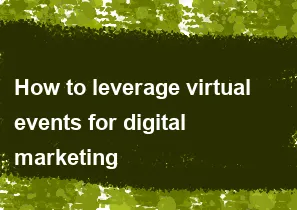How to leverage virtual events for digital marketing

Leveraging virtual events for digital marketing can be a powerful strategy to reach and engage your target audience. Here are some tips to make the most out of virtual events for your digital marketing efforts:
Strategic Planning:
- Clearly define your goals and objectives for the virtual event.
- Identify your target audience and tailor your marketing efforts to reach them effectively.
- Develop a timeline and plan for pre-event, during-event, and post-event marketing activities.
Engaging Content:
- Create compelling and relevant content that resonates with your audience.
- Offer valuable insights, education, or entertainment to keep participants engaged.
- Consider using multimedia elements like videos, interactive polls, and Q&A sessions.
Multi-Channel Promotion:
- Promote your virtual event across various digital channels such as social media, email, your website, and relevant industry forums.
- Use targeted advertising to reach specific demographics and interests.
- Collaborate with influencers or partners to extend your reach.
Landing Page Optimization:
- Design an informative and visually appealing landing page for your virtual event.
- Clearly communicate the value proposition and highlight key event details.
- Include a simple registration process and a call-to-action to encourage sign-ups.
Engagement Tools:
- Utilize engagement tools within the virtual event platform, such as chat, polls, and Q&A features.
- Encourage audience interaction and participation to enhance the overall experience.
- Leverage gamification elements to make the event more enjoyable and memorable.
Networking Opportunities:
- Provide virtual networking opportunities for participants to connect with each other.
- Facilitate one-on-one meetings, group discussions, or virtual networking sessions.
- Encourage the use of social media hashtags for attendees to share their experiences.
Post-Event Follow-Up:
- Continue your digital marketing efforts after the event to maintain momentum.
- Share post-event content such as recordings, highlights, or key takeaways.
- Collect feedback through surveys and use it to improve future events.
Analytics and Measurement:
- Monitor key performance indicators (KPIs) such as attendance, engagement, and conversion rates.
- Analyze data to understand what worked well and areas for improvement.
- Use insights to refine your digital marketing strategy for future virtual events.
Sponsorships and Partnerships:
- Consider partnering with sponsors or other organizations to increase event visibility.
- Collaborate on promotional efforts and offer shared value to both parties.
Continuous Improvement:
- Gather feedback from participants and stakeholders for continuous improvement.
- Adapt your digital marketing strategy based on the evolving landscape and participant preferences.
By strategically planning and executing your virtual events with a focus on engagement and value, you can effectively leverage them for digital marketing and achieve your business objectives.
-
Popular Post
- How to optimize for Google's About This Result feature for local businesses
- How to implement multi-language support in an Express.js application
- How to handle and optimize for changes in mobile search behavior
- How to handle CORS in a Node.js application
- How to use Vue.js with a UI framework (e.g., Vuetify, Element UI)
- How to configure Laravel Telescope for monitoring and profiling API requests
- How to create a command-line tool using the Commander.js library in Node.js
- How to implement code splitting in a React.js application
- How to use the AWS SDK for Node.js to interact with various AWS services
- How to use the Node.js Stream API for efficient data processing
- How to implement a cookie parser middleware in Node.js
- How to implement WebSockets for real-time communication in React
-
Latest Post
- How to implement a dynamic form with dynamic field styling based on user input in Next.js
- How to create a custom hook for handling user interactions with the browser's device motion in Next.js
- How to create a custom hook for handling user interactions with the browser's battery status in Next.js
- How to implement a dynamic form with dynamic field visibility based on user input in Next.js
- How to implement a dynamic form with real-time collaboration features in Next.js
- How to create a custom hook for handling user interactions with the browser's media devices in Next.js
- How to use the useSWRInfinite hook for paginating data with a custom loading indicator in Next.js
- How to create a custom hook for handling user interactions with the browser's network status in Next.js
- How to create a custom hook for handling user interactions with the browser's location in Next.js
- How to implement a dynamic form with multi-language support in Next.js
- How to create a custom hook for handling user interactions with the browser's ambient light sensor in Next.js
- How to use the useHover hook for creating interactive image zoom effects in Next.js